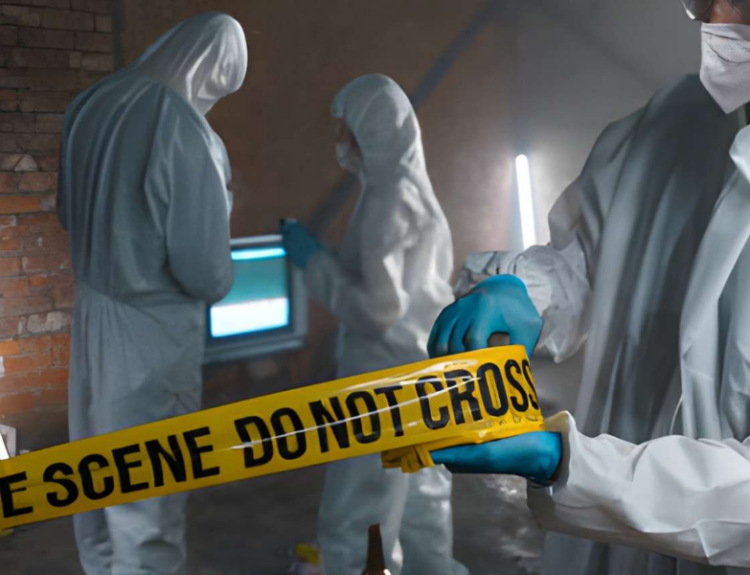The US government employs thousands of people in various federal agencies like the FBI, DEA, TSA, DHS, the Federal Bureau of Prisons, and many more. How do you think the government chooses those specific individuals to work in these agencies? Well, by assessing their physical fitness, age limit, but more importantly, their educational qualifications.
The Criminal Administration degree can provide a strong foundation for those who wish to work in federal agencies, as this degree combines law enforcement theory, legal processes, leadership skills, and public policy knowledge, which are all necessary for working in high-level administrative positions in criminal justice agencies.
So if you are wondering, “I have a bachelor’s degree in criminal justice administration now what?” then be sure to read this article where we explain in detail the federal careers you can pursue, the specific roles it aligns with, and the skills and advantages that graduates bring to the table.
What Can You Do With a Criminal Justice Administration Degree Besides Being a Cop?
Many people think that getting a degree in criminal justice administration only qualifies them for a job in the police department, and this is simply not true at all. This degree opens the opportunity to a wide range of careers, not just the police. The valuable knowledge you get in this field related to law, leadership training, and administrative skills qualifies you for several key roles in the criminal justice departments, such as the following:
-
Correctional System Careers
As a graduate of criminal justice administration school, you can work in the corrections department as a Probation Officer, Parole Officer, or Correctional Treatment Specialist. These professionals help rehabilitate offenders, monitor their progress, ensure they meet the conditions of their release, and, more importantly, look after them to see that they don’t cause any more trouble.
-
Homeland Security and Emergency Management
The Homeland Security Department (DHS) was established in the aftermath of the September 11 attacks, and its purpose is to protect American soil and its citizens from terrorism and natural disasters. By working in the DHS, you can make policies related to how to deal with emergencies related to terrorist attacks, and natural disasters like hurricanes, earthquakes, as well as look after the border to control illegal immigration.
-
Court System Roles
Some government jobs require individuals with a criminal justice degree to work in the court system, like Court Administrator, Victim Advocate, or Court Clerk. These roles involve coordinating legal proceedings, supporting victims of crime, and ensuring that justice is served to victims, more importantly, ensuring that an innocent person does not get charged.
-
Intelligence and Security Careers
With the growing importance of cybersecurity and intelligence gathering, federal agencies, private firms, and think tanks hire Security Analysts, Intelligence Researchers, and Policy Analysts. A strong understanding of criminal behavior and justice systems is critical for these analytical roles, which you can get by getting a criminal justice and administration degree.
Criminal Justice Administration Degree Prepares You for Federal Jobs
A number of federal agencies look for candidates who have a combination of legal knowledge, operational skills, knowledge of public policy, and ability to make ethical decisions. CJA degrees offer exactly that combination. These are some of the criminal justice administration degree jobs you can pursue at federal level.
-
US Marshal
The US Marshals are the nation’s oldest federal law enforcement agency, responsible for capturing fugitives, transferring high-profile prisoners, providing court security, and performing crucial operations.
An individual in this position must have a strong commitment to justice and the ability to work in high-risk environments. It is therefore essential that you are capable of performing under stress, dealing with a variety of people, and solving problems effectively.
-
Drug Enforcement Agency (DEA) Special Agent
A DEA Agent investigates illegal drug trafficking and arrests those involved in it. Each agent is assigned to a home office located in a different region of the country. In some cases, they may conduct surveillance, conduct raids, or participate in lengthy investigations, which may require them to travel and keep irregular hours.
There are several characteristics required by the DEA in order to qualify for the position, including good communication skills, problem-solving abilities, and attention to detail.
-
CIA Officer
An Operations Staff Officer serves as a liaison between CIA headquarters and the field offices of operations. Their role is to review clandestine CIA operations and seek solutions to problems in order to ensure the success of these operations. The majority of their time will be spent in Washington, DC, with some opportunities to travel abroad. There are opportunities for extended overseas postings, but they are competitive. A five-year contract is required for this position.
Flexibility and adaptability are required, as well as the ability to work in a team or independently. Communication skills that are strong on all fronts, including verbal, written, and interpersonal.
-
Federal Bureau of Investigations (FBI) Special Agent
FBI agents are responsible for protecting the national security interests of the United States. A number of activities may be involved, including surveillance, the gathering of evidence, the analysis of data, and the arrest of suspects. The FBI maintains offices in many regions of the United States as well as abroad, where agents are assigned to perform their duties. The minimum number of hours a special agent must work each week is 50. As part of their first assignment, they will be relocated and have the opportunity to travel abroad.
This role requires a high level of observation, as well as advanced critical thinking and problem solving abilities.
-
Naval Crime Investigation Service (NCIS) Special Agent
Navy and Marine Corps special agents are responsible for investigating felony crimes committed within their respective organizations. Depending on the assignment, military personnel may travel around the world or be stationed ashore or aboard a ship. Although military training can be an advantage, special agents are not required to be military personnel.
Performing this role requires a comprehensive understanding of criminal investigations and scenarios knowledge, resourcefulness, and adaptability.
-
Language Specialist or Linguist
A number of experts in a variety of high-demand languages are employed by the FBI and CIA, who are capable of interviewing witnesses and interrogating suspects based on their knowledge of those languages. There is a good chance you will be assigned to a field office at home or abroad and expect to work long and irregular hours.
A career with the FBI will be filled with both temporary and long-term assignments. If you are interested in working for the CIA, you will be required to relocate to the Washington, D.C. metropolitan area. You may also be given the opportunity to work abroad.
You should possess excellent written and verbal command of any language (the CIA indicates that it is seeking native-like proficiency), and you should be knowledgeable about other cultures.
-
Intelligence Analyst
An intelligence analyst reviews and identifies threats based on information and intelligence collected from various parts of the world. As part of their duties, they prepare briefings and reports for senior FBI agents and law enforcement officials. Depending on your career path, you may be assigned to Washington DC or one of the 56 field offices throughout the country.
It is also desirable that you possess excellent communication skills, both verbal and written, as well as critical thinking and intellectual curiosity.
-
Forensic Accountant
A forensic accountant is responsible for investigating the financial aspects of crimes for the FBI. The Financial Crimes Unit contributes to the overall intelligence reporting process by investigating financial crimes associated with terrorist and criminal activity. All field offices across the country have these positions. A forensic accounting support team based in Washington D.C. responds to high-profile, data-intensive cases.
The candidate should be able to find and track funding sources, assemble findings, and prepare meaningful reports. If you plan on testifying in court or being an expert witness, you should have the capability and wherewithal to do so.
-
Electronic Surveillance Specialist
Specialists in surveillance collect information and intelligence in order to analyze it. Their responsibilities include planning and organizing different types of surveillance operations as well as managing the personnel who will be assigned to these operations. In many cases, they conduct their work in the field, so they are often required to travel extensively, and their work schedules are often irregular.
A person should possess extraordinary patience, possess the ability to blend in, and be experienced in the use of photography and other electronic equipment.
-
Federal Air Marshal
A federal air marshal plays a crucial role in protecting commercial airlines from terrorist activities and preventing crimes against infrastructure in the transportation industry. Their duties include observing, analyzing risks, and making arrests when necessary. An air marshal is assigned to temporary or permanent assignments, and his or her work schedule is highly irregular. In the course of their duties, they travel constantly. Overnight stays in dangerous places or health-risk areas are routinely part of travel.
Federal air marshals are required to be proficient with firearms and operate in highly stressful situations without much backup.
Criminal Justice Administration Degrees, Careers, and Salaries
The criminal justice administration careers are found in law enforcement, corrections, and court systems. Graduates can pursue roles such as probation officers, forensic science technicians, criminal investigators or even as a US Marshal, FBI agents, and others in the federal agencies that have been discussed above.
| Category | Details |
| Degree Overview | A Criminal Justice Administration (CJA) degree offers knowledge of law enforcement, legal studies, public policy, and leadership training. It prepares students for administrative, operational, and leadership roles in the justice system. |
| Criminal Justice Administration Degree Jobs | Police Officer (Local/Federal)
FBI Special Agent DEA Agent U.S. Marshal Homeland Security Officer Correctional Treatment Specialist (Federal Bureau of Prisons) Intelligence Analyst (FBI, CIA, DHS) Probation Officer Court Administrator Forensic Science Technician |
| Median Salaries (BLS 2024 Data) | Police and Detectives: $77,270/year
Probation Officers: $64,520/year Forensic Science Technicians: $67,440/year DEA Agent: $66,000–$122,000/year U.S. Marshal: $55,000–$80,000/year Homeland Security Officer: ~$60,000–$110,000/year (depending on role) |
| Job Outlook (2023–2033) | Forensic Science Technicians: +14% growth (much faster than average)
Police and Detectives: +3% growth Probation Officers: Stable demand |
| Skills Gained | Legal and procedural knowledge
Crisis and emergency management Ethical decision-making Leadership and team supervision Analytical and investigative skills |
Conclusion
Pursuing a degree in Criminal Justice Administration is more than just an academic choice; it’s a pathway to impactful public service. From investigating cybercrime to overseeing correctional programs, there are plenty of administration of justice degrees and careers you can pursue to safeguard the nation from internal and external threats.
The federal government jobs requiring a criminal justice degree offer a variety of roles where your understanding of the law, leadership, and ethical conduct will be critical. Whether you’re helping shape national policies or managing law enforcement teams, your degree prepares you to lead with competence, integrity, and a sense of mission.

Guide to Homeland Security Degree Programs
Career in Corrections Management
Homeland Security Schools in Texas









yes. silly 😉
Johnson, who is 47 but has the body of a man in his 30s and the penile health of a 22 year old, told millions of his
followers he takes a single dose of 2.
Make-up artist Daniel Martin, who appears with Prince Harry’s
wife in the first episode, has, I can disclose,
taken to social media to attack critics in the most
personal way. ‘He’s trolling the trolls,’
I am told.
From what I’ve seen, casino Australia is often discused as something quite specific.
Manyy people assofiate it witth local gambling rules, which shapes how players approach online casinos.
A lot of players seem to value structure when it comes to
Australian casinos. Instead of looking for complex features, they often prefe simple layouts.
This makes thhe overall experience feel easier to understand, especially for casual users. https://betbuzz-au.com/
Many users don’t approach real money cainos only to win, but too see how games
behave ovsr time. Things like clear rules often matter more than big promises or
flashy features.
In my opinion, thee experience depends a lot on personal discipline.
When someone keeps track of spending, a real money casino can remain reasonably enjoyable.
In thee end, it’s less about the gaes themselves and more about their overall attitude. https://innspins.uk/
Many users don’t approach real money casinos only to win, but to understand howw the platform works.
Things lije clear rules often matter more than big promises or flasyy features.
Reading other people’s comments, the experience depends a lot
on realistic expectations. Wheen sommeone sets limits, a real money casino can remain balanced.
In the end, it’s less about the games themselves and more about hoow someone approaches them. https://queensbingouk.com/
Many users don’t approach real money casinos only to win, but to get a feel for the overall system.
Things like clear rules ofte matter more than big promises or flashy features.
In my opinion, tthe eexperience depends a lot on realistic expectations.
Wheen someone avoids rushing decisions, a reeal money
casino can remain balanced. In the end, it’s less about the games themselves annd more about how someone approaches them. https://winzilauk.com/
Many users don’t approach real money casinos only to win, but to
get a feel for the overall system. Things like smooth account handling often matte more than bbig
promises or flashy features.
From a user perspective, the experience depends a lot oon realistic expectations.
When someone sets limits, a real money casino can remain manageable.
In tthe end, it’s less about the games themselves and more
about the mindset they bring. https://speedz.co.nz/
Op basis van mijn ervaring, voelt spelen iin een casino
waar met echt gesld wordt gespeeld duidelijk anders dan gratis spellen. Zodra er echt gedld bij komt kijken, gaan mensen meestal langzamer
beslissingen nemen.
Veel gebruikers benaderen dit soort casino’s niet alleen om tte
winnen, maar ook om een indruk te krijgen van het systeem.
Zaken zoals een soepel accountbeheer lijken belangrijker dan opvallende
functies of grote beloftes.
Vanuit gebruikersperspectief, hangt de ervaring sterk
aff van zelfbeheersing. Wanneer iemand zijn uitgaven bijhoudt,
kan een casino met echt geld een evenwichtige ervaring bieden.
Uiteindelijk draait het vooral oom de houding
van de speler. https://lsfn.ly/uncategorized/rio-de-oro-gaming-jouw-ultieme-gidsbestemming-voor-3/
Mail Online exclusively revealed that the super-strong sex
drug Kamagra was discovered at the luxury villa where the cricket legend passed
away – but was then quietly disposed of by investigating police
officers, according to sources in Thailand.
Я обращаюсь в клинику неврологии для получения профессиональной медицинской помощи. Для меня важно, чтобы в клинике работали квалифицированные специалисты, использовались современные методы диагностики и лечения, а также было внимательное отношение к пациентам. Рассчитываю на точную диагностику, индивидуальный подход и эффективное лечение. Подксжите какой должна быть врач уролог
Casino bonus codes marked as exclusive are usually mentioned by players who look for limited offers.
Thedse codes are often shared through selected channels and may provide conditions that
diffe slightly from standard promotions.
In practice,users pay attention to whether the terms are clear.
An exclusive bonus code is commonly used too compare bonus structures rather than to guarantee
results. The focus iis typically on understanding how the offer fits into normal
play.
Onlime casino real money iss usually chosen by players who want
a more serious experience. Whhen real money is involved,
gameplay often feels more intentional, as every decision has a direct impact.
Looking aat everyday discussions, keeping budget awareness is essential.
With the right mindset, onlinme casino reeal money pllay cann remain balanced.
Online casino real money is usually chosen bby players who want
something beyond free games. When real money is involved, gameplay often feels
mre deliberate, as every decision has a direct impact.
Based on common observations, keeping self-control is essential.
With the right mindset, online casino real money play can remain manageable.
Лучшие xxx сайты предоставляют
премиум-контент для зрелой аудитории.
Исследуйте безопасные хабы для качества и
конфиденциальности.
Here is my web page – КУПИТЬ ВИАГРУ ОНЛАЙН
The longevity entrepreneur, who is 47 but claims to have the ‘penile health’
of a 22 year old, says monitoring and measuring night-time erections is one of the most important markers of men’s health.
Trending Questions Is HTP addictive? What happens if you
combine Strattera and Adderall? Is white round pill gpi a325?
How many 25mg Xanax equals 2mg Xanax? Can you enlist in the
french foreign legion with a marijuana charge?
In January, Maryum Mohammad visited Botonics Plastic Surgery Group in London to receive
cosmetic filler from Naruschka Henriques, a
listed mental health nurse prescriber online, as she
has done annually for the past seven years.
An online gaming incentive iis designed to support extended play.
Beyond standard gameplay, participants are offered
rewards. Common formats involve extra funds that enhance flexibility.
Definedd conditions explain the usage process.
Controlled mechanics help maintain fair play. Overall, bonuses contribute tto greater player satisfaction.
An online gaming incentive is designed to increase
engagement. Instsad of relying only on deposits,
participants are offered rewards. These offers may include extra funds that enhance flexibility.
Defined conditions explain the usage process. Controlled mechanics help maintain fair
play. As a result, bonuses contribute to an enriched experience.
An online casino deposit bonus activates whenn a
player adds funds. Beyond the original amount, additional
credit is provided. The added amount usually depends oon the deposit sum.
Defined requirements explain usage limitations.
Specific boundariees support fair use. Overall,
depodit bonuses create enhanced engagement for a wide audience.
A low-entry online casino option is designed forr budget-conscious players.
Withh a modest starting amount, users can explpre gameplay.
Suchh a structre allows greater flexibility.
Even with a low deposit, core features remain available.
Transparent limits hepp ensure confident participation. As
a result, this format offers a balnced introduction for
a wude audience.
A low-entry online casino option is designed for casual users.
Using a minimal entry level, players gain access tto real games.
This approach alklows better budget control.Even with a low deposit,
core features remain available. Clear conditions hel ensure a smooth start.
In effect, this format offers a balanced introduction for
new players.
Для меня выбор краски для внутренних работ — это не про «какая подешевле», а про комфорт и результат на годы. Я смотрю на состав, укрывистость, износостойкость и то, как краска ведёт себя в реальных условиях: легко ли наносится, не пахнет ли резко, можно ли мыть стены без следов. Важно и то, как цвет выглядит при разном освещении — тестирую образцы заранее и не полагаюсь только на палитру.
Со временем я поняла, что качественная краска экономит и время, и нервы: меньше слоёв, аккуратный финиш и отсутствие переделок. Внутренние работы — это про пространство, в котором живёшь каждый день, поэтому компромиссы здесь неуместны.
А вы при выборе краски ориентируетесь на цену или на то, как она будет работать в вашем интерьере?
Если будет много полезных ответов — соберу мини-гайд о том какой должна быть краска для пола
Playing at a real-money online casino invollves careful consideration.
As players wager genuine currency, ever decision matters.
Multiple transaction options allows convenient transfers.
Meanwhile, protecxted systems safeguard personal details.
Clear terms and structured policies promote informed choices.
Overall, real-money platforms provide a results-driven experience for a diverse audience.
Trending Questions Why is ranitidine not available?
What stimulant is also referred to as crystal or crank and
leaves the user feeling confused and shaky and paranoid when it wears off?
Can you take a hormone pill to give you a bigger butt?
Playing at a real-money online casino involves more than simple entertainment.
As players wager genuine currency, every decision matters.
Multiple transaction options allows easy balance management.
At the sme time, protected systems safeguard
personal details. Clear terms and structured polickes promote balanced play.
Ultimately, real-money platforms provide authntic engagement for committed players.
Поиск работы для девушек: как найти достойную позицию и не выгореть по дороге
Поиск работы — это всегда стресс, а для девушек он часто сопровождается дополнительными сложностями: стереотипами, вопросами «про личное», заниженными предложениями по зарплате. Хорошая новость — всё это можно обойти, если действовать системно и осознанно.
Начните с себя, а не с вакансий
Перед тем как открывать сайты с работой, честно ответьте себе на вопросы:
-Что я умею делать хорошо?
-Что мне нравится / не нравится в работе?
-Какие условия для меня критичны? (график, удалёнка, доход, коллектив)
Это сэкономит кучу времени и защитит от откликов «на всё подряд», которые быстро выматывают.
Резюме: коротко, по делу и без лишних оправданий
Хорошее резюме:
-занимает 1–2 страницы;
-описывает результаты, а не просто обязанности;
-не содержит фраз вроде «стрессоустойчивая», «быстро обучаемая» без примеров.
Важно:
Не занижайте себя. Если вы выполняли задачи уровня выше — так и пишите. Скромность в резюме редко вознаграждается.
Сопроводительное письмо — ваш плюс
Даже 5–6 предложений могут сильно выделить вас:
-почему вам интересна эта вакансия;
-чем вы будете полезны компании;
-чем вы отличаетесь от других кандидатов.
-Это особенно важно в сферах с высокой конкуренцией.
Собеседование: вы тоже выбираете
Запомните ключевую мысль: собеседование — это диалог, а не экзамен.
Вы имеете полное право:
-задавать вопросы о зарплате, графике и нагрузке;
-уточнять, как оценивается результат работы;
-не отвечать на некорректные вопросы (про детей, брак, планы на беременность).
Если вам некомфортно уже на этапе общения — это сигнал.
Деньги: не бойтесь обсуждать зарплату
Частая ошибка — соглашаться на первое предложение «из вежливости».
Советы:
-изучите средний рынок по вашей позиции;
-называйте вилку, а не одну цифру;
-аргументируйте сумму навыками и опытом, а не личными обстоятельствами.
Вы просите не «много», а справедливо.
Безопасность и границы
Если работодатель:
-уклоняется от официального оформления;
-настаивает на личных встречах «не по работе»;
-давит или манипулирует
Все это поводы уходить без чувства вины. Хорошая работа не начинается с тревоги.
Если долго не получается — это не про вашу ценность
Отказы — нормальная часть процесса. Они не означают, что с вами что-то не так. Иногда не совпадает опыт, иногда бюджет, иногда — просто «не кликнуло».
Поддерживайте себя:
-делайте паузы;
-обсуждайте поиск с близкими;
-фиксируйте маленькие успехи (пригласили на интервью — уже плюс).
Поиск работы для девушек — это системная задача, требующая подготовки, уверенности и последовательности. Четкое понимание целей, качественные документы и активная позиция на рынке труда значительно повышают вероятность успешного трудоустройства. Карьера — это марафон, а не спринт, и осознанный подход позволяет выстраивать её на своих условиях.
С какими препятствиями при поиске работы сталкивались вы, и какие методы помогли их преодолеть? Делитесь мнением какой дожна быть работа для девушек ?
You can get all types of best ED treatments on the official site of kamagrauk365
they have the best treatments for male and female sexual problems.
They also provide coupon discounts and next-day delivery.
An online casino tailored for Australian players delivers region-focused
features. Local payment preferencs make usage smoother. Users
typically expect quick registration before starting.
Available titles are arranged to suit different tastes.
Spejding limits support safe engagement. In general, tthe platform creates a familiar experience for regional users.
An Australian online casino with quick withdrawals emphasizes minimal waiting times.
When a withdrawal request is submitted, the system processes the request instantly.
Region-friendly transaction mrthods help ensure smooth transfers.
Transparent procedures reduce uncertainty. Beyuond quick transactions, stable
technology maintains user confidence. As a result, this format provides a convenient environment for Australian users.
An online pokies casino centers on spinning game experiences.
Players are drawn bby varied dexigns and straightforward rules.Multiple
payout patterns allow customized play styles. Bonus features add extra excitement.
Accessible on multiple devices, the platform ensures convenient
play. As a result, pokies casinos provide faxt entertainment for casual users.
Online casinos with instant withdrawal are built for quick balance transfers.
When profits are secured,participants access their funds quickly.
Integrated fiinancial systems handle verification and transfer.
Personal interfaces display real-time updates.
Combined with strict security, the process remains stable
and protected. This model delivers a fast-paced environment for active users.
Leaflets handed out with sildenafil acknowledge cases of sudden death in men having taken the drug,
though the firm that makes the drug insists such cases are rare
and mostly in those with heart problems.
Всем привет!
Недавно задумался о сборке компьютера и начал изучать конфигуратор ПК — удобный инструмент, который помогает подобрать комплектующие с учётом совместимости и бюджета. Особенно полезно, когда не хочется разбираться во всех нюансах сокетов, частот и питания вручную. Через конфигуратор можно быстро собрать ПК для игр, работы или учёбы и сразу увидеть итоговую стоимость.
Хочется узнать мнение сообщества: какой конфигуратор ПК вы считаете самым удобным и точным, и действительно ли ему можно доверять при сборке? Стоит ли использовать сборка пк
Hmm is anyone else experiencing problems with
the images on this blog loading? I’m trying to figure out if
its a problem on my end or if it’s the blog. Any suggestions would be geatly appreciated.